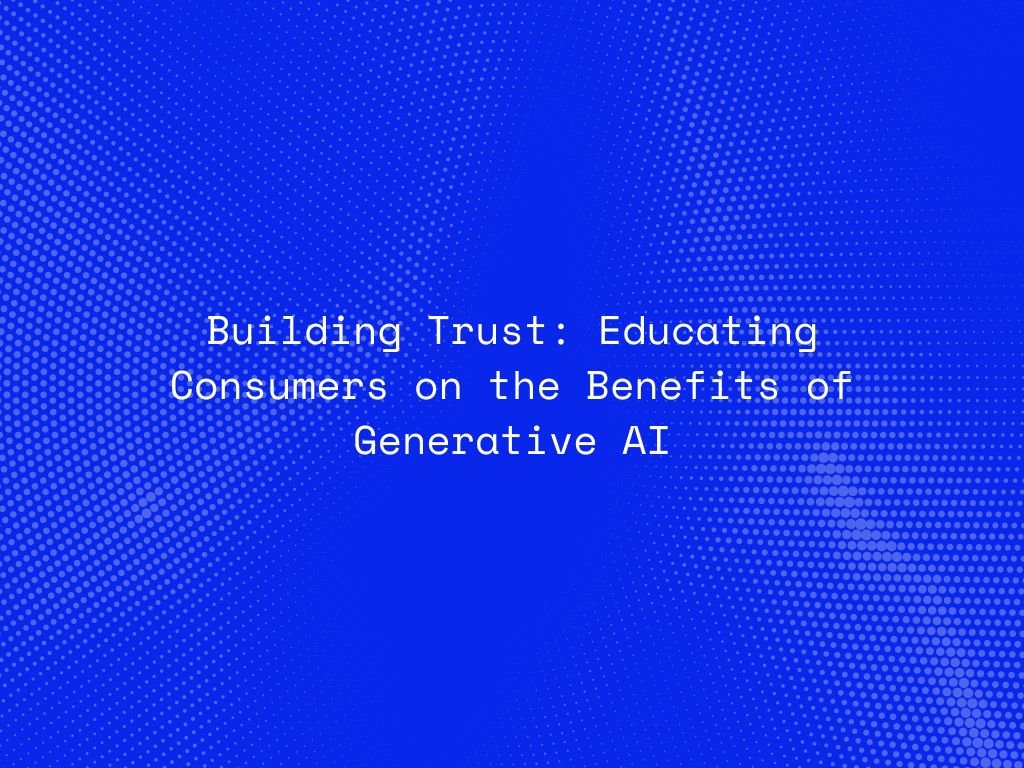In today’s fast-paced digital world, generative AI is becoming an integral part of various industries, from retail to media and entertainment. This revolutionary technology has the potential to transform how businesses operate, innovate, and engage with customers. However, for generative AI to reach its full potential, consumer trust and understanding are paramount. In this blog, we will explore the benefits of generative AI, address common misconceptions, and highlight the importance of consumer education in fostering trust and acceptance of this powerful technology.
Understanding Generative AI
Generative AI refers to algorithms that can create new content, such as text, images, and music, by learning patterns from existing data. Unlike traditional AI, which focuses on analyzing and predicting, generative AI emphasizes creativity and innovation. For instance, in retail, generative AI can personalize shopping experiences by creating customized product recommendations. In manufacturing, it can optimize design processes by generating new prototypes based on predefined criteria. In media and entertainment, it can assist in content creation, such as writing scripts or composing music.
The benefits of generative AI are vast. It enhances efficiency by automating repetitive tasks, fosters creativity by generating novel ideas, and improves personalization by tailoring products and services to individual preferences. However, these advantages can only be realized if consumers trust and understand the technology behind them.
Common Misconceptions about Generative AI
Despite its benefits, generative AI is often misunderstood. One common fear is that AI will lead to job displacement. While it’s true that AI can automate certain tasks, it also creates new opportunities for human workers, particularly in roles that require creativity and strategic thinking.
Another concern is the ethical implications of AI, particularly around bias and fairness. It’s crucial to understand that AI systems are only as unbiased as the data they are trained on. Addressing these ethical concerns requires ongoing efforts to ensure transparency and fairness in AI development.
Finally, there’s a myth that AI will replace human creativity. In reality, AI can augment human creativity by providing new tools and inspiration. For example, AI-generated art can inspire artists to explore new styles and techniques.
Importance of Consumer Education
Educating consumers about generative AI is key to building trust and fostering acceptance. Transparency and clear communication can demystify AI technologies and address fears and misconceptions. Successful consumer education campaigns in other technological fields, such as data privacy and cybersecurity, have shown that informed consumers are more likely to embrace new technologies.
Connect With Us
Educational Initiatives and Strategies
Various companies, organizations, and governments are already taking steps to educate the public about AI. For example, Google’s “AI for Everyone” initiative aims to make AI education accessible to all, while IBM’s “AI Fairness 360” toolkit provides resources for understanding and mitigating bias in AI systems.
Businesses can implement their own educational strategies by organizing workshops, webinars, and interactive content. Engaging with the community through open forums and discussions can also help build a more informed and trusting consumer base.
The Future of Generative AI and Consumer Trust
As generative AI continues to evolve, so will the relationship between consumers and AI technologies. The future of AI adoption depends on ongoing education and transparent communication. By investing in consumer education, businesses can build a foundation of trust that will support the widespread acceptance and integration of generative AI.
Conclusion
In conclusion, educating consumers about the benefits and realities of generative AI is essential for building trust and fostering acceptance. By addressing common misconceptions and highlighting the importance of transparency, businesses can pave the way for a future where AI and consumers coexist harmoniously. Let’s work together to create a world where the full potential of generative AI can be realized.
We invite you to share your thoughts and experiences with generative AI in the comments below. Businesses interested in enhancing their AI education efforts can reach out for more resources and support. Let’s continue the conversation and build a future of trust and innovation together.




